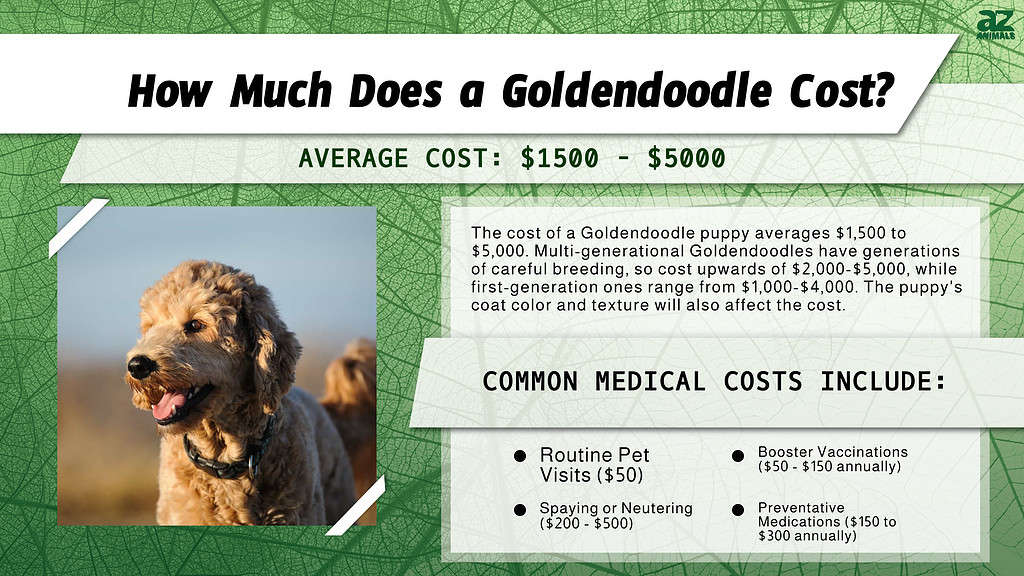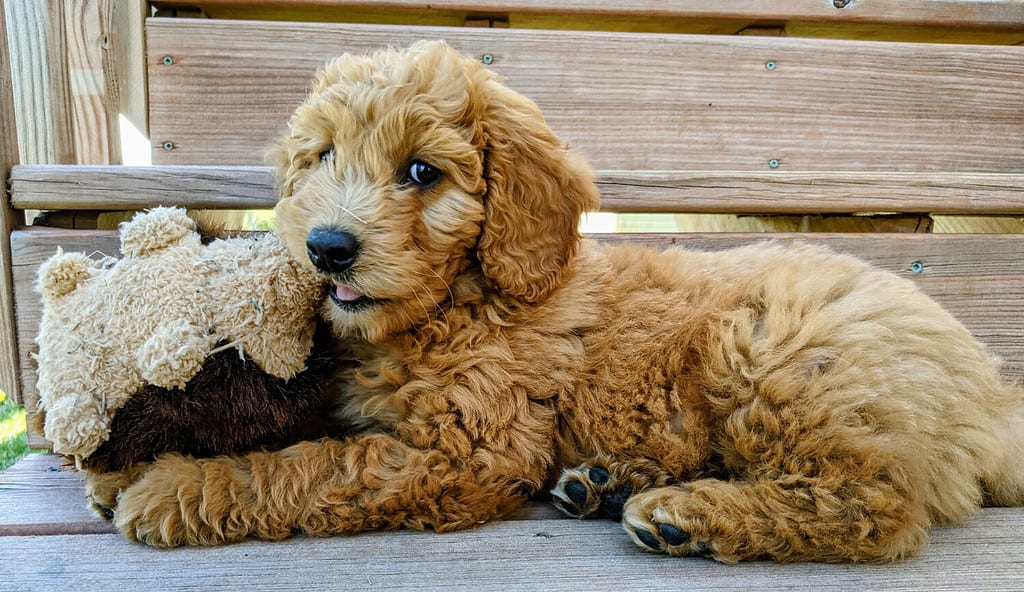Goldendoodles are slowly becoming more and more popular. They’re easily one of the most popular mixed breeds, with many breeders now producing them exclusively.
However, they’re still somewhat rare, so finding a breeder can be challenging. Furthermore, the demand is often higher than the supply, so purchasing a puppy is often expensive.
Below, we’ll go over Goldendoodle prices and how much it costs to take care of them.

How Much Does a Goldendoodle Puppy Cost?
Goldendoodle puppies vary a lot in price. There are many factors involved that may make a puppy cheaper or more expensive. You can generally find them for around $1500 to $5000. However, their price can vary substantially.
Other Factors Affecting the Price of Goldendoodles

factors affect how much a Goldendoodle costs.
©JennyandCasey/Shutterstock.com
Generation
Goldendoodles are often priced depending on their generation. F1 Goldendoodles are directly descended from golden retrievers and poodles. Their parents are of two different breeds, which means that these dogs are 50/50 mixtures of the two breeds.
These dogs tend to be less predictable, as you never know what traits they will inherit from their very different parents.
Subsequent generations, such as F1B (backcrossed with a poodle) and F2 (two F1 Goldendoodles bred together), are also common. Multi-generational Goldendoodles are bred from Goldendoodle parents whose lineage can be traced back several generations.
Generally, first-generation Goldendoodles are less expensive because they are unpredictable and common. Multi-generational Goldendoodles tend to have generations of careful breeding that have increased the chance of desirable traits.
Here are some simple price estimates for each generation:
- F1 Goldendoodle: $1,000 to $3,000
- F1B Goldendoodle: $1,500 to $4,000
- F2 Goldendoodle: $1,200 to $3,500
- Multi-Generational Goldendoodle: $2,000 to $5,000
Coat Type and Color
The exact traits a Goldendoodle has will affect its price, too. Goldendoodles can have almost any coat type, ranging from straight to curly. However, curly-coated dogs are highly sought after and often low-shedding. Therefore, they tend to cost more.
Straight and wavy coats tend to come in earlier generations before careful breeding. They may also shed considerably, though this can vary.
Some coat colors are more sought after than others, too. Shades like apricot, red, and parti-color are often in high demand and may fetch a higher price. If you aren’t too set on your dog’s coat color, you may be able to get them for cheaper.
- Straight or Wavy Coat: $1,500 to $3,000
- Curly Coat (more desirable): $2,000 to $4,500
- Rare Coat Colors (e.g., apricot, red, parti-color): $2,500 to $5,000
Size Variations
Goldendoodles come in four different main sizes: Toy (10-15 inches tall), Miniature (15-17 inches tall), Medium (17-21 inches tall), and Standard (21-24 inches tall). Larger dogs tend to cost more, and they are more expensive to breed. They need more space and food, and their healthcare tends to be more expensive.
All of these costs add up to more expensive dogs.
However, in urban areas, Toy and Minature Goldendoodles may be more expensive. There is a higher demand for compact pets in these areas, which can increase pricing.
- Toy Goldendoodle: $2,000 to $4,000
- Miniature Goldendoodle: $1,800 to $3,500
- Medium Goldendoodle: $1,500 to $3,000
- Standard Goldendoodle: $1,200 to $2,500
Health Testing and Guarantees
You should only purchase dogs from a reputable breeder, as they perform the proper health testing to ensure their breeding dogs don’t have any genetic issues. The puppies they produce are much less likely to inherit serious health conditions, which can affect their veterinary costs further down the line.
However, this health testing costs money. Therefore, these puppies tend to be more expensive. The price is with it, though, as you may pay far less for upkeep.
Location
Where you live also affects the price. In areas with a higher cost of living, everything tends to be more expensive, including the price of dogs. Furthermore, regions with very few breeders may have higher costs. Areas with more breeders may have more competitive prices as they have to compete with others.
However, transporting dogs from other regions is also very expensive. Therefore, it often doesn’t make sense to shop outside of your area.
Breeder
The high demand across the world for Goldenddoodles has increased breeding activity. Unfortunately, this has led to an influx of irresponsible breeders, including puppy mills. These breeders prioritize quantity over the health and well-being of their dogs. Often, this lowers the overall quality of Goldendoodles on the market.
Reputable breeders will prioritize the health and well-being of their dogs instead of trying to produce as many people as possible. We recommend being very cautious about where you purchase your puppy from, even if that means spending a bit more money.
You can also purchase Goldendoodles from adoption and rescue agencies. Often, these dogs are much cheaper. However, Goldendoodles are still rare, which makes finding them at rescue agencies challenging.
Often, these dogs also tend to be older, as well. If you’re looking for a puppy, adoption probably isn’t the best option.
Current Goldendoodle Price Trends

Goldendoodles are slowly becoming more popular, which has caused their price to rise.
©iStock.com/Marcello Sgarlato
The popularity of Goldendoodle continues to be on the rise. Therefore, these dogs tend to be getting more and more expensive. Their low-shedding coats and friendly temperament make them appealing to families and individuals.
However, this also means more breeders are deciding to specialize in this breed. You may be more likely to find a breeder near you, which may lower your overall costs, as well. Still, the demand for Goldendoodles remains high in many regions.
Goldendoodle prices can vary greatly from one region to another. In areas with a higher concentration of reputable breeders and a relatively stable supply of Goldendoodles, prices may be more competitive. Conversely, regions with limited availability and high demand for Goldendoodles may experience higher prices.
The demand for Goldendoodles tends to experience seasonal fluctuations. There are often peaks around holidays and vacations when families are more likely to bring a new puppy home. Goldendoodles may be hard to find during these times (or more expensive).
Where to Find Goldendoodles for Sale

You may pay a higher price for your Goldendoodle if access to the breed is limited in your location.
©Rena Schild/Shutterstock.com
There are many places you can find a Goldendoodle for sale. Where you find the puppy for sale can affect the price of the puppy. You may want to check several locations if you can to compare pricing.
Local Breeders
You may be able to find a breeder within driving distance, especially since Goldendoodles are becoming more and more popular. However, other times, you may have to travel some distance to find a breeder near you.
Be sure to always find an ethical breeder if that’s the direction you decide to go. Prioritize the health and well-being of the puppy. Don’t try to save a few bucks. Research the breeders within driving distance from you through dog clubs and trusted sources.
If possible, schedule a visit to the breeder’s facility to meet the parent dogs and see the living conditions of the puppies. A reputable breeder will be open to visitors and will happily answer your questions.
Adoption Centers and Rescues
Occasionally, Goldendoodles may end up at adoption centers or rescues. Often, dogs purchased from reputable breeders don’t end up in these facilities, as the breeder will typically take the dog back. Therefore, most Goldendoodles at rescues are “oops” puppies or from lower-quality breeding situations (like puppy mills).
Adoption fees are generally lower than purchasing from a breeder, and you’ll be providing a second chance to a deserving dog.
Your best bet is to find organizations specializing in this breed (or either of their parent breeds). Often, these organizations swoop up any Goldendoodles in shelters.
Online Platforms and Websites
Look for reputable websites that connect buyers with responsible breeders. Websites that require breeders to adhere to certain standards and provide health guarantees can be a good option.
However, be cautious about online scams and ensure you verify the legitimacy of the breeder before making any payments.
Some breeders and rescue organizations may advertise available Goldendoodles on social media platforms. Follow reputable pages or groups to stay updated on potential opportunities.
Warning Signs of Unethical Practices

Goldendoodles are sadly commonly bred by puppy mills.
©DBjorgo/Shutterstock.com
Goldendoodles are not AKC-registered or anything of that sort. Therefore, it’s important to stay vigilant and avoid unethical breeders. Goldendoodle puppies are worth a lot of money, so they’re a common breed for backyard breeders and puppy mills.
Poor breeding practices can lead to behavioral and health issues for your dog. Here are some warning signs to look out for:
- Multiple Breeds Offered: It isn’t odd for breeders to offer Goldendoodles and similar breeds (like Labradoodles). However, if the breeder offers a dozen different breeds or several unrelated breeds, it may be a sign that they’re trying to keep up with the trends – not focused on supporting the health of their dogs.
- Lack of Health Testing: Reputable breeders prioritize the health of their breeding dogs and conduct appropriate health testing to screen for genetic conditions that may be prevalent in the breed. If a breeder can’t or won’t provide information on health testing or guarantees, it’s a warning sign of potential health issues in the puppies.
- Poor Living Conditions: Any breeder should allow you to see the conditions their dogs are kept in. If they won’t allow a tour or allow you to see the puppies’ mother, it’s a warning sign that they may be trying to hide poor living conditions.
- Lack of Socialization: Puppies must be socialized from a young age to become well-mannered dogs. Therefore, quality breeders will start socialization right away. If a breeder doesn’t, it’s often a sign that they have too many puppies
- Pushy Sales Tactics: No quality breeder will ever try to push you into purchasing a puppy or rushing your decision. Instead, quality breeders often do the opposite – making their potential buyers sit on a waiting list for potentially months.
- No Contract or Guarantees: Quality breeders often provide written contracts that outline the sale, your responsibilities, and a health guarantee. If a breeder doesn’t have those documents, you should be cautious about proceeding.
- Multiple Litters Available at Once: Much about breeding dogs is random. So, it isn’t odd for breeders to sometimes have two litters at once. However, quality breeders do not plan to have several litters at once, as they simply don’t have enough time. If a breeder is having several litters, it may be that they’re spending less time with their puppies.
- No Health Records: A responsible breeder keeps detailed health records for their puppies, including vaccinations and deworming schedules. The lack of proper health records might indicate negligence in the puppy’s care.
- No Questions Asked: If a breeder doesn’t ask questions about your lifestyle and home, they probably aren’t the best option. Most breeders have applications that must be filled out before they sell their puppies. If a breeder shows little interest in your living situation or ability to care for a Goldendoodle, it may be a sign that they’re mostly focused on profit.
Don’t try to save money by overlooking these red flags. You don’t want a puppy with poor health or behavior, firstly. You also don’t want to support breeders with poor breeding practices, as this only puts more puppies at risk.
Cost of Vaccination and Other Medical Expenses for Goldendoodles

Goldendoodles require similar medical care to other dogs.
©anetapics/Shutterstock.com
The cost of vaccination and other medical expenses for Goldendoodles can vary depending on various factors such as location, veterinary clinic fees, and the specific medical services required.
All dogs will need veterinary care. Often, the costs are highest when the dog is young or older. Younger puppies need vaccinations and regular vet visits. Older dogs often end up with health problems of some sort and may need more regular vet visits to catch potential health issues early.
Initial Vaccinations
When you first bring home a Goldendoodle puppy, it will require a series of vaccinations to protect against common canine diseases. These vaccinations typically include distemper, rabies, and Bordetella.
These vaccinations will typically cost $100 to $300 in total. However, the cost can vary from vet to vet. This cost will typically be spread over several visits.
Booster Vaccinations
Puppies get their initial vaccinations. However, your Goldendoodle will need booster shots throughout its life to maintain immunity. Booster vaccinations are usually needed annually or every three years, depending on the vaccine.
Often, each set of boosters costs $50 – $150.
Spaying or Neutering
If your Goldendoodle is not already spayed or neutered when you bring them home, you might consider having the procedure done. Spaying (for females) or neutering (for males) helps prevent unwanted litters and can also have health benefits.
Many breeders require that puppies sold as pets be spayed or neutered. Therefore, you may have to do it as part of your contract.
Often, this costs anywhere from $200 to $500, with females typically costing more than males.
Microchipping
Microchipping is a permanent form of identification that can greatly improve your dog’s chance of finding its home if it gets lost. This procedure is very inexpensive at around $50 to $75. Once you have it done, you don’t have to worry about it again.
Routine Vet Visits
Every dog requires regular checkups with its vet. These visits are usually when your dog will get their booster vaccinations, so they are required if only for that purpose. However, they also help vets spot illnesses before they become too serious.
Usually, office visits cost around $50. However, you’ll have to consider all the costs that go with what services are provided at that visit, too.
Preventive Medications
Goldendoodles, like all dogs, require preventive medications to protect against parasites such as fleas, ticks, and heartworms. The cost of these medications can vary based on the size of your Goldendoodle and the brand of medication used.
On average, you can expect to spend around $150 to $300 per year on preventive medications.
Emergency or Unexpected Vet Care
Most dogs get sick or injured at some point. It’s important to prepare for unexpected medical expenses, which tend to occur when you least expect them. It’s a great idea to insure your dog and have an emergency fund for these situations.
The cost of emergency vet care varies widely depending on what’s wrong with your dog. A simple visit may cost $200, while an injury that requires surgery and several visits may cost thousands.
Cost of Food and Supplies for Goldendoodles

Be sure to budget enough to cover your Goldendoodle’s price.
©iStock.com/Guy Banville
You also need to consider the cost of food and supplies required to upkeep your Goldendoodle. These dogs aren’t particularly more expensive than others.
Food
Plan to feed your dog high-quality food that meets its nutritional needs. Goldendoodles do not need special food, though they often benefit from food formulated for their size. For instance, if they are larger, purchase large-breed dog food.
Usually, you can expect to spend around $30 to $60 for dog food.
Treats
Training treats are necessary when training your pooch. You should use fairly small treats, as you don’t want your canine consuming tons of calories from treats. A bag of treats can range from $10 to $30. However, they should last you a while.
Feel free to break treats apart if they are too large!
Toys
Goldendoodles are decently active dogs. Therefore, you’ll need to purchase plenty of toys to keep them mentally and physically stimulated. The cost of toys varies widely, though. You’ll probably need around $100 when you first adopt your puppy. After that, you’ll probably need to spend around $30 to $50 a month replacing toys.
Grooming Supplies
Goldendoodles require regular grooming. However, exactly what grooming they need depends on the dog. They may have curly or straight coats, greatly changing their grooming needs.
You must purchase around $100 of grooming supplies when you first adopt your dog. After that, most of your cost will come from professional grooming sessions, which will cost $40 to $100, depending on your dog’s needs.
Collar, Leash, and ID Tag
While these items aren’t terribly expensive, they are absolutely necessary. The cost of a collar, leash, and ID tag can range from $20 to $50, depending on the materials and quality.
You won’t have to replace these items for a while, though you may need to replace the leash and collar every few years.
Dog Bed
Most dogs like to use a dog bed, which may cost around $50 to $100. These dog beds vary widely in cost, though. You’ll probably need to start with one size and upgrade as your dog grows.
Crate
A crate is vital for a Goldendoodle. They should be crate trained and allowed continuous access to their crate to use as a safe and secure space. These crates typically cost around $150 for the size you’ll need.
Smaller Goldendoodles may only need a $50 crate.
How Much Does it Cost to Insure a Goldendoodle?
Dog insurance varies widely in price. Different companies use different algorithms for determining monthly premiums. Therefore, it’s often a good idea to shop around to find the best price.
On average, pet insurance for a Goldendoodle may cost between $30 to $60 per month.
There are many factors that affect how much a Goldendoodle might cost to insure. Here are some of the most important ones:
- Age: Younger Goldendoodles generally have lower insurance premiums than older dogs. Insuring a puppy might be more affordable compared to insuring a senior Goldendoodle.
- Location: The cost of veterinary care can vary depending on your location. In areas with higher veterinary expenses, the insurance premium might be higher.
- Coverage Plan: The level of coverage you choose affects the premium. Comprehensive plans covering accidents, illnesses, and routine care will have higher premiums than basic accident-only plans.
- Deductible: The deductible is the amount you must pay out of pocket before the insurance coverage kicks in. A higher deductible often leads to lower monthly premiums.
- Reimbursement Percentage: The percentage of veterinary costs the insurance company reimburses after you meet the deductible can impact the premium. Higher reimbursement percentages usually mean higher premiums.
- Pre-existing Conditions: Pet insurance typically does not cover pre-existing conditions. If your Goldendoodle has pre-existing health issues, the insurance provider might exclude those conditions from coverage.
How Much Does It Cost to Train a Goldendoodle
Training your Goldendoodle is essential. However, the cost of training can vary depending on what direction you go. Here are some of the most popular training options and their cost:
- Puppy Training Classes: Puppy training classes are designed for puppies. We highly recommend them, as they provide basic command training and socialization. Often, these last for several weeks and cost around $200.
- Basic Obedience Training: These classes are essential for dogs that don’t attend puppy classes. They teach basic commands that every dog needs to know. Usually, they cost around $200, as well.
- Advanced Training: If you’re interested in more advanced training, such as off-leash obedience, trick training, or specific tasks like therapy dog training, the cost can increase significantly. Advanced training programs may range from $500 to $1,500 or more, depending on the complexity and duration of the training.
- Behavioral Training: Some dogs may need specialized training if they exhibit behavioral issues like aggression, fear, or separation anxiety. A certified behaviorist can be extremely expensive to employ. Costs may be as high as $1,500 or more.
- Board and Train Programs: Some trainers offer board and train programs where your Goldendoodle stays with the trainer for an extended period for intensive training. These programs can be convenient for busy owners but may be more expensive, ranging from $1,000 to $3,000 or higher, depending on the duration and the training provided.
- Private Training Sessions: We recommend group sessions for dogs that can handle them, as they provide the socialization that dogs need. However, aggressive dogs may require private sessions. These are often more expensive, usually costing between $40 to $100 per session.
Ready to discover the top 10 cutest dog breeds in the entire world?
How about the fastest dogs, the largest dogs and those that are -- quite frankly -- just the kindest dogs on the planet? Each day, AZ Animals sends out lists just like this to our thousands of email subscribers. And the best part? It's FREE. Join today by entering your email below.
Thank you for reading! Have some feedback for us? Contact the AZ Animals editorial team.








